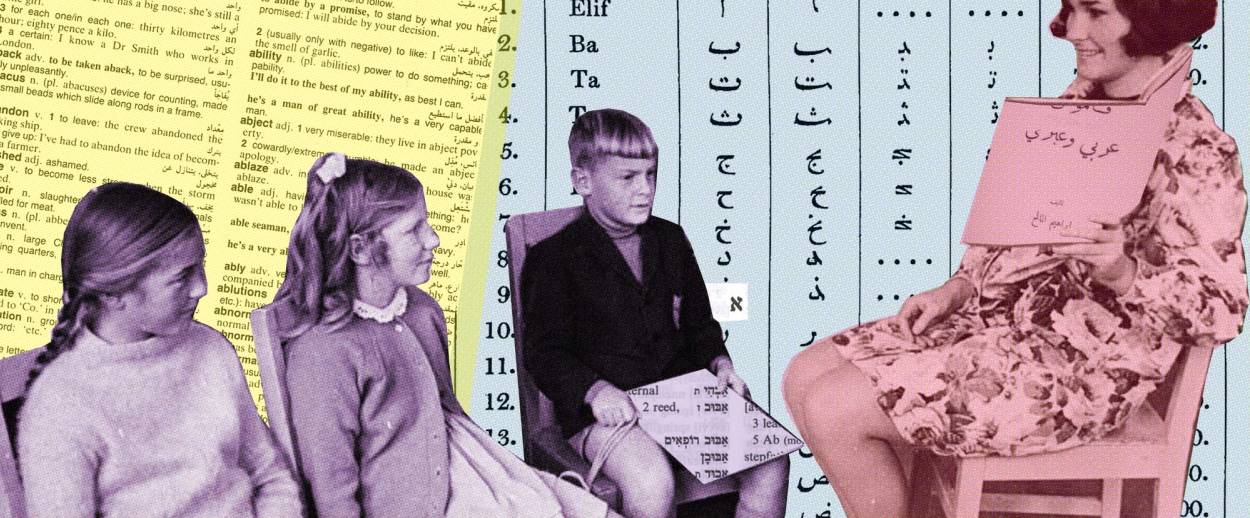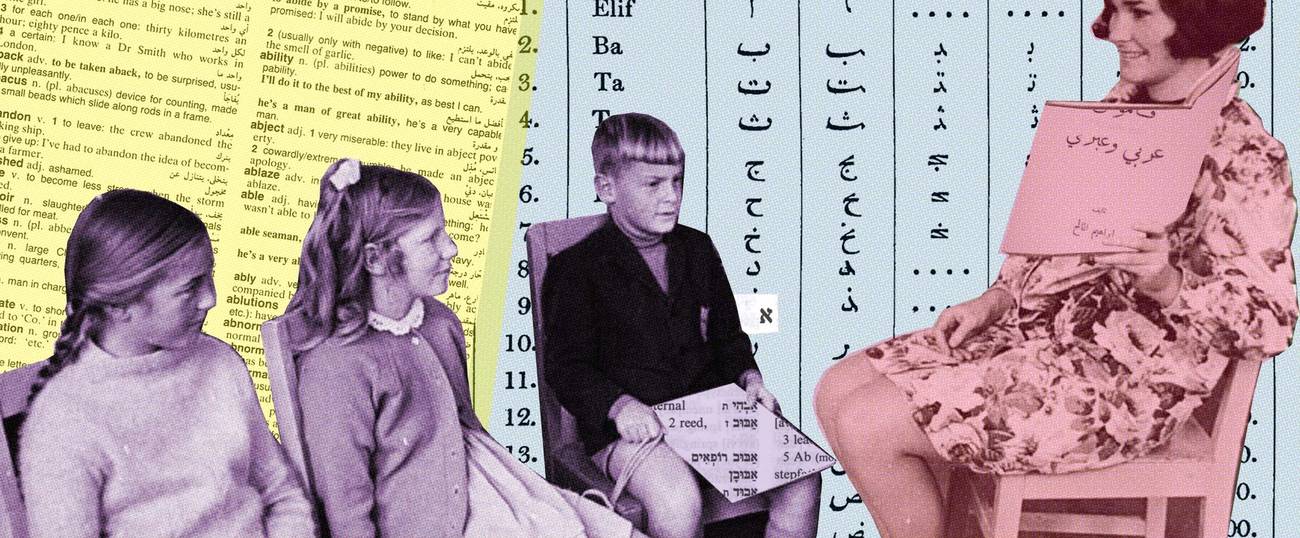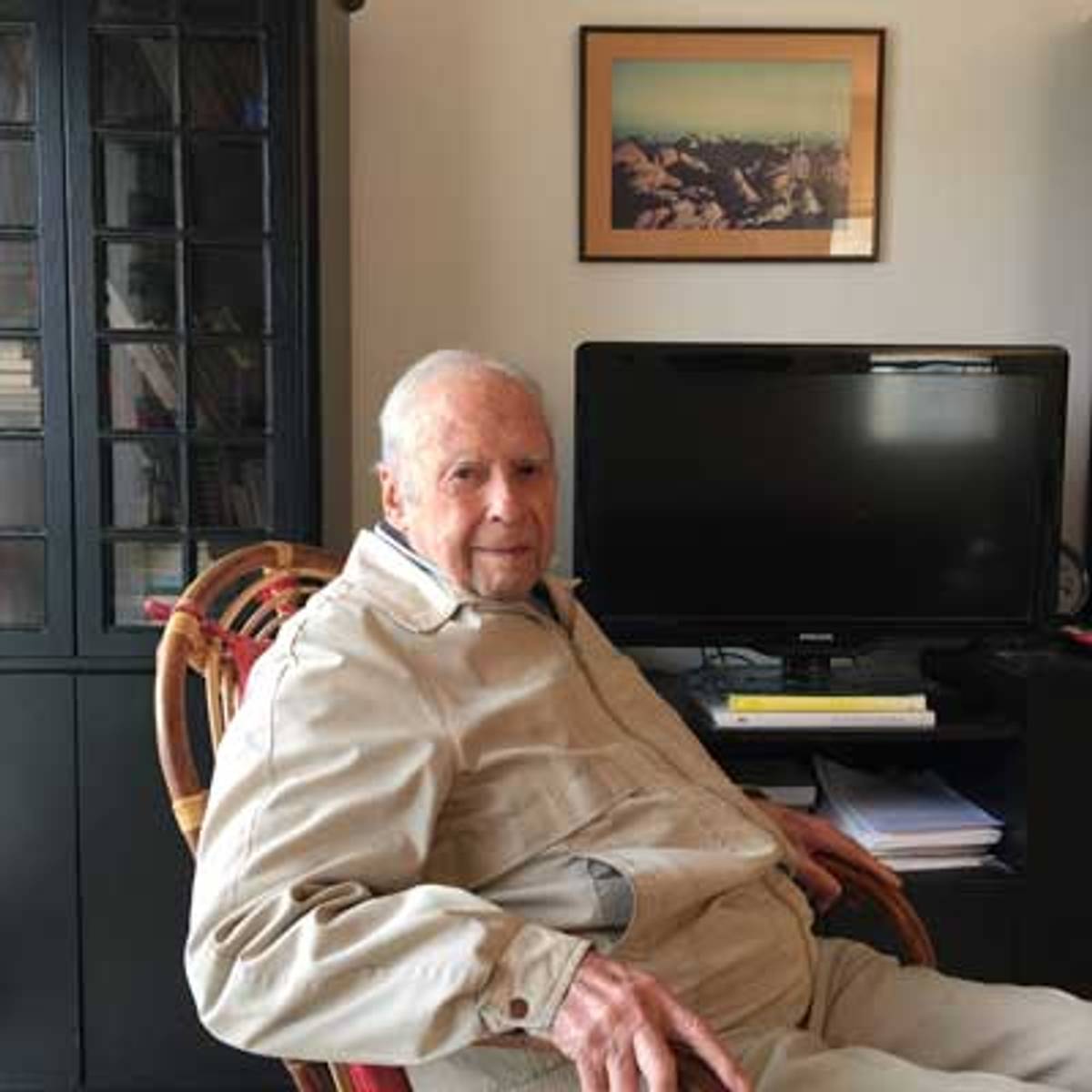The Zionist Monk Who Teaches Israelis How To Speak Arabic
A 90-year-old Catholic is the author of numerous textbooks and dictionaries on the colloquial dialect of the Palestinians




Two weeks shy of 90, Yohanan Elihai is feverishly working in his Jerusalem study on updating his Arabic-Hebrew dictionary, published by the Ministry of Defense over a decade ago. That dictionary contains 5,000 words and 10,000 sentences; but he would like it to conform to his famous Arabic-English Olive Tree Dictionary, published in 2007, which contains 8,000 words and 17,000 sentences. Widely acknowledged as the most authoritative Arabic teacher in the country, Elihai is also the author of numerous textbooks and dictionaries on the colloquial dialect of the Palestinians. He is also a Catholic monk.
Ever since he decided to tie his life to the destiny of the Jewish people and immigrated to Israel six decades ago, Elihai has considered himself a Zionist. But peeking out of his living room window at the Arab village of Sur Baher, he looks back at a life lived in two parallel worlds. “I am a Christian, 100 percent Israeli, who loves the Palestinians,” he recently told an interviewer. “I wish for our well-being, but for theirs, too.”
Elihai, then known as Jean Leroy, was 18 when the American Army entered Paris, vanquishing its Nazi occupiers. On Aug. 25, 1944, the teenager boarded a train from his home near Versailles, making the short trip to the French capital to take part in the festivities. Pushing through the overjoyed crowds handing out flowers on the streets amid the liberators’ tanks, Leroy found himself standing next to the U.S. embassy. The Americans had put up large posters of starving Jews at the embassy windows, images captured from the Holocaust. “Under Nazi occupation we were literally starving, and I heard my grandmother once say, ‘We are suffering, but the Jews are suffering more,’ ” he recalled. “I have no idea how she knew.”

Seeing the graphic confirmation of his grandmother’s truth in the streets of Paris came as a shock. “That shock is what brought me here,” he said of that day in late August. “The Holocaust made me want to live with this people and share its experiences in Israel. The new life you’ve created here is the answer: The Germans were unable to annihilate you.”
His connection to Arabic began shortly after his discovery of the Jewish plight. During the War, he became fascinated with the biography of Charles de Foucauld, a French national who abandoned his career as a soldier in 1886 for the life of a hermit in the desert of southern Algeria. In 1933, five seminarians from Paris established a monastic order called the Little Brothers of Jesus. These “Brothers” were sent to work as laborers in impoverished communities across the globe, dressed in plain clothes and refraining from proselytization.
The graduate of a religious seminary, Leroy wrote to the priests and asked to join their group, but was told he was too young. “I didn’t want to be a priest in France,” he recalled. He joined the French army instead, volunteering to teach in a Jesuit school in Lebanon. “The only time in my life I wore a black robe was during my military service,” he laughs.
Upon his return to France in 1947, now a member of the Little Brothers of Jesus, Leroy was already becoming somewhat of a Zionist, inspired by an article he had read about the construction of a new Hebrew city north of Jaffa: Tel Aviv. But his colleagues, mostly workers living among Muslims in North Africa, decided his Arabic would be put to better use in Syria.
In Damascus, Leroy’s day job was to produce metal dishes. But in his spare time—as he did in Lebanon—he would document the Syrian dialect, compiling a personal dictionary that contained 5,000 words. In 1950, after a year in Damascus being followed by Syrian intelligence, he learned that the Little Sisters of Jesus—the female equivalent of his order—were preparing to open a branch in Israel.
“I wrote to the head of the order saying, ‘You sent me here, but this isn’t what I want.’ Since seeing those pictures of the Holocaust I wanted to go to Israel.” But the reaction of his superior, whom he met in Marseille soon after, left him disappointed. “He said: ‘You want Jews? You should know that Zionism won’t work. The Jews may be capable of managing a bank or a clothing shop, but a state with an army? Never.’ ”
Leroy’s fixation with the Jews would better be addressed in the Moroccan city of Marrakech, where an ancient community still thrived, the priest exclaimed. But the Moroccan Jews were suspicious of the strange Catholic who insisted on communicating with them in French and broken Hebrew. “In my prayers, I would ask God: ‘Why did you, the all-knowing, let me waste three years of my life studying Arabic instead of starting immediately with Hebrew?’ ” he recalled. “God pushed aside a small cloud, winked at me, and said: ‘Just you wait, my friend, and one day you’ll understand.”
***
Leroy arrived in Israel in 1956, after finally convincing his superiors to send him to the Jewish state. Settling in Tel Aviv, he began manufacturing ceramics under the famous craftsman and artist Aharon Kahana. The highlight of his career, Leroy recalled, was being commissioned to lay tiles spelling the names of European concentration camps on the floor of the Yizkor tent at Yad Vashem, Jerusalem’s Holocaust memorial. “For three months I laid those names one by one: Bergen-Belsen, Dachau, Auschwitz,” he remembers. “For me, it was God confirming my choice to come.”
Three years after his arrival, Leroy applied for Israeli citizenship. At the time, many new immigrants were Hebraizing their names, and Leroy too wanted to make a statement. Atheism was becoming fashionable in Europe and the United States, and he insisted his family name would attest to his faith: Elihai means “My God is alive” in Hebrew.
Realizing that Israel’s Arab minority was not being addressed by the Little Brothers of Jesus, Elihai relocated in 1965 to the Christian village of Tarshiha in the Upper Galilee. “I found that I learned things I never knew before living only among Jews,” he said of that time, referring to government confiscation of Arab lands and daily life under military jurisdiction, which Israel finally abolished in 1966.
Alongside his discovery of the hard realities of Arab-Israeli life, Elihai began studying the Palestinian dialect of Arabic in earnest. “I had a friend in Tarshiha who was a builder. When he returned from work, he would tell me about his life, his childhood, how he met his wife. I recorded all of it,” he recalled. In the evenings, Elihai would sit with local families watching TV, documenting their conversations, which became the basis for his first Arabic textbook, written in French for the use of expatriates living in Israel. The course was later translated into Hebrew with the help of Hebrew University professor Haim Blanc.
Yet the challenge of teaching Arabic to Jewish Israelis remains a formidable one. According to a study conducted by Jerusalem’s Van Leer Institute in 2015, while 58 percent of Israeli Jews believe it is important to study Arabic, only 10 percent say they speak or understand the language well. Just 2.6 percent report being able to read an Arabic newspaper. Ignorance of the language is even more widespread among the younger generation.
Part of the problem stems from the discrepancy between literary Arabic—used by the media and in writing—and the spoken dialects. Although Arabic enjoys the status of an official language in Israel, it is not mandatory in Jewish schools, unlike English. The Arabic promoted by Israel’s education system is known as Modern Standard Arabic, enabling diligent students to read a newspaper or understand a passage from the Quran, but not to ask for a pound of apples in the market.
“Language is the key to the heart,” Elihai said, underscoring the importance of colloquial Arabic. His method stresses the importance of accurate pronunciation, which is why he chose to transliterate the Arabic into English or Hebrew characters, with special signs signifying the intricacies of every vowel. “The accent in which a particular language is spoken is like the color of a person’s hair or eyes,” Elihai writes in the preface to his language course Speaking Arabic. “In other words, it’s part of the ‘personality’ of the language. Sloppy pronunciation is like ignoring what is special about a person.”
Discussing the quality of Arabic-language education in Israel may not pack the same emotional punch as news bulletins about terror attacks or heated discussions of the Nakba and BDS. However, listening to Elihai, it is hard not to agree that Israelis could be spending less time talking about politics and instead pay more attention to teaching and learning Arabic. “Before reading a newspaper, you should speak to your neighbor,” he said. “I meet many people who tell me they’ve studied Arabic for three years and forgot it all. That seems like a terrible shame to me.”
***
You can help support Tablet’s unique brand of Jewish journalism. Click here to donate today.
Elhanan Miller (@ElhananMiller) is a Jerusalem-based reporter specializing in the Arab world.